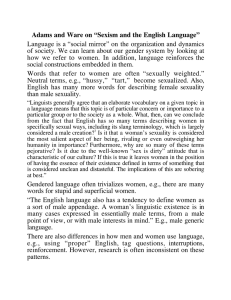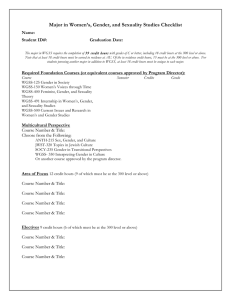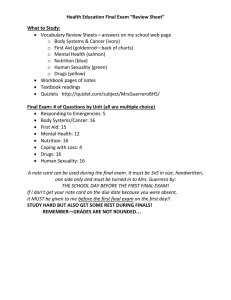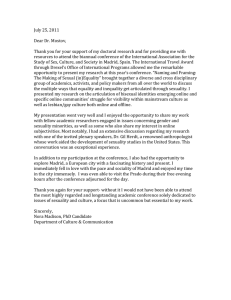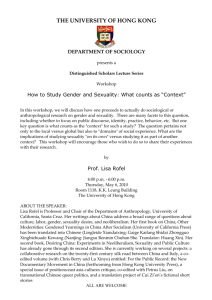Brandeis University Women’s and Gender Studies Program
advertisement
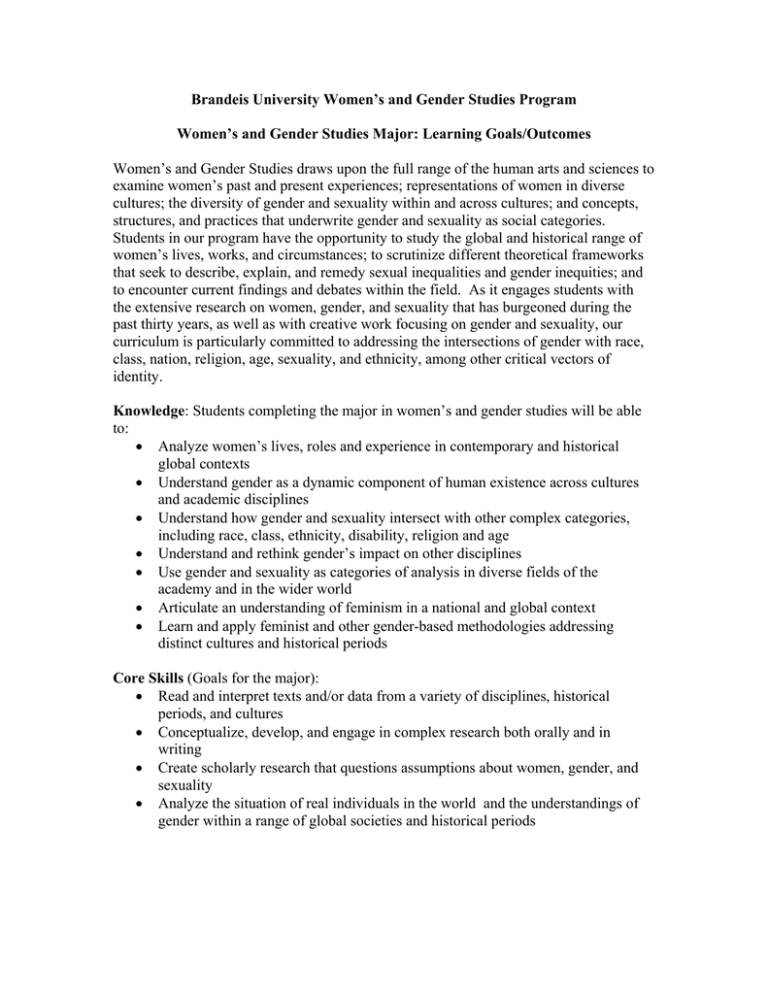
Brandeis University Women’s and Gender Studies Program Women’s and Gender Studies Major: Learning Goals/Outcomes Women’s and Gender Studies draws upon the full range of the human arts and sciences to examine women’s past and present experiences; representations of women in diverse cultures; the diversity of gender and sexuality within and across cultures; and concepts, structures, and practices that underwrite gender and sexuality as social categories. Students in our program have the opportunity to study the global and historical range of women’s lives, works, and circumstances; to scrutinize different theoretical frameworks that seek to describe, explain, and remedy sexual inequalities and gender inequities; and to encounter current findings and debates within the field. As it engages students with the extensive research on women, gender, and sexuality that has burgeoned during the past thirty years, as well as with creative work focusing on gender and sexuality, our curriculum is particularly committed to addressing the intersections of gender with race, class, nation, religion, age, sexuality, and ethnicity, among other critical vectors of identity. Knowledge: Students completing the major in women’s and gender studies will be able to: Analyze women’s lives, roles and experience in contemporary and historical global contexts Understand gender as a dynamic component of human existence across cultures and academic disciplines Understand how gender and sexuality intersect with other complex categories, including race, class, ethnicity, disability, religion and age Understand and rethink gender’s impact on other disciplines Use gender and sexuality as categories of analysis in diverse fields of the academy and in the wider world Articulate an understanding of feminism in a national and global context Learn and apply feminist and other gender-based methodologies addressing distinct cultures and historical periods Core Skills (Goals for the major): Read and interpret texts and/or data from a variety of disciplines, historical periods, and cultures Conceptualize, develop, and engage in complex research both orally and in writing Create scholarly research that questions assumptions about women, gender, and sexuality Analyze the situation of real individuals in the world and the understandings of gender within a range of global societies and historical periods Social Justice: Women’s and gender studies as a field is explicitly committed to fostering justice for all women, men, and gender non-conforming individuals world-wide. It is thus necessarily concerned with the structural inequalities wrought not only by sexism but by racism, economic exploitation, imperialism, global traffic, religious oppression, homophobia, and transphobia, among other instruments or expressions of inequality. Our Women’s and Gender Studies Program has pledged as a primary commitment to prepare students to analyze systems of power and privilege, to examine the causes, manifestations, and consequences of institutional discrimination of every kind, and to understand and respect a range of cultural perspectives. This commitment necessarily means learning about the different experiences and struggles of women both around the world and within the United States. Not only the topics in our curriculum but the writings, theories, and empirical research we assign are deliberately diverse in the ethnicity, race, sexuality, gender identity, and nationality of their authors. As a program we are committed to what has been recently identified as intersectionality: a theory that recognizes the interconnected nature of experience, discrimination, and privilege, and that explores the interactive ways in which identities intersect or converge to form patterns of dominance, subordination, exclusion and possibility. Experiential Learning: Because women’s and gender studies developed in conjunction with a wider movement for social justice and because studying women’s lives past and present necessarily means confronting social, political, economic and cultural inequalities, women’s studies tends to encourage students toward experiential and activist learning. (Sometimes the movement lies in the other direction: students already concerned about injustice are motivated to gain the intellectual background to act effectively.) Our program provides particular opportunities for service learning and is developing new ones. In the 1990s the Program established an annual internship course, When Violence Hits Home: Internship in Domestic Violence (WMNS 92a). This course provides students with a rigorous intellectual study of gender and violence as well as guidance through a semester-long internship. Many students have extended their internships into the full year, have drawn their senior projects from this field, and have gone on to related careers. Upon Graduation: The women's and gender studies curriculum prepares students for a wide range of careers. Graduates of our program are applying their skills and knowledge to academic and professional pursuits in medicine, law, education, government, social service, public policy, religion, counseling, international relations, journalism, publishing, business, and the arts.
